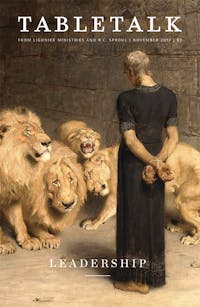
Request your free, three-month trial to Tabletalk magazine. You’ll receive the print issue monthly and gain immediate digital access to decades of archives. This trial is risk-free. No credit card required.
Try Tabletalk NowAlready receive Tabletalk magazine every month?
Verify your email address to gain unlimited access.
We have entered a new era of modern history. This era is marked by a gaping void of leadership, but also by an antipathy toward the very notion of leadership. What’s more, there is a growing trend that celebrates self-appointed leaders who have demonstrated a lack of integrity and to ignore and dishonor faithful, aged leaders whose integrity has been proven over the course of decades. Leaders of courage and conviction are despised and leaders of compromise and concession are idolized. We now live in a world that applauds Chamberlains and mocks Churchills. If this were true only in the world, it would perhaps be more bearable, but sadly it is also true in the church and in the home.
Some Christians have even gone so far as to insinuate that leadership is not a biblical category, suggesting that servanthood should displace the notion of leadership. However, such a proposition not only creates a false dilemma but undermines Scripture, which teaches us that the role of leader is appointed by God. Leaders ought to lead with diligence, and those who are under leaders ought to obey and submit to them and imitate them (Rom. 12:8; 1 Cor. 12:28; Heb. 13:7–24). Although we have all observed poor leadership and have at times experienced a leader’s abuse of power, we must nevertheless recognize that God has appointed leaders in the world, the government, the workplace, the school, the church, and the home. As Christians, we cannot allow ourselves to fall into the trap of cynicism that questions all authority and leaves us wallowing in the mire of our own self-appointed authority. We are all under authority, and we all have leaders to whom we are accountable, just as all leaders are under the authority of God and ultimately accountable to Him.
Leadership and servanthood are not mutually exclusive. Leaders are first and foremost servants of God who serve by leading. The most essential quality of leadership is humility, and authentic humility is manifested by courage, compassion, and conviction. A faithful leader is a humble leader who leads foremost by love, not fear. A faithful leader is not concerned with being liked by everyone. A faithful leader knows how to delegate, trusts his delegates, and isn’t concerned with who gets the credit. A faithful leader knows his shortcomings and sins and leads a life of repentance and forgiveness. Ultimately, a faithful leader is a faithful follower of Jesus Christ, who has led us by serving us with humility, sacrifice, and joy.
